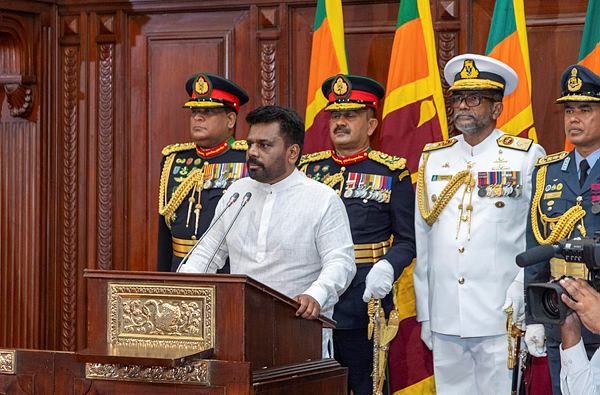Marxist leader Anura Kumara Dissanayake was sworn in as Sri Lanka’s ninth president on Monday, pledging to usher in a “Renaissance” for the nation. The 56-year-old leader took his oath at the Presidential Secretariat, with Chief Justice Jayantha Jayasuriya presiding over the ceremony.
In his inaugural address, Dissanayake expressed gratitude to his predecessor Ranil Wickremesinghe for respecting the people’s mandate and ensuring a peaceful transfer of power. He vowed to uphold democracy and work towards restoring trust in politicians.
“I assure you that I will do my best to preserve democracy and restore the honour of politicians, as people have misgivings about their conduct,” he said.
Acknowledging Sri Lanka’s need for global cooperation, Dissanayake emphasized that he is not a “magician” but part of a collective effort to lift the economically challenged nation. “I am an ordinary citizen with strengths and weaknesses. My first task is to harness the talents of the people and make informed decisions for the betterment of this country,” he said.
India-Sri Lanka relation
In a post on X (formerly Twitter) after the ceremony, Dissanayake reiterated his commitment to bringing a “new era of Renaissance” to Sri Lanka. He also thanked Indian Prime Minister Narendra Modi for his congratulatory message, pledging to strengthen bilateral ties.
“Thank you, Prime Minister Modi, for your kind words and support. I share your commitment to enhancing cooperation between our nations for the benefit of our peoples and the region,” he wrote.
Dressed in a white tunic and black trousers, Dissanayake received blessings from Buddhist clergy following the swearing-in. He is the leader of the Marxist Janatha Vimukthi Peramuna (JVP) party’s broader front, the National People’s Power (NPP), and emerged victorious in Saturday’s presidential election.
He defeated his closest rival, Sajith Premadasa of the Samagi Jana Balawegaya (SJB), in the first election since mass protests ousted Gotabaya Rajapaksa in 2022 due to an economic crisis.
Dissanayake’s victory comes after a second round of vote counting, where he secured 5.74 million votes, surpassing Premadasa’s 4.53 million. His anti-corruption stance and call for a change in the political system resonated particularly with young voters demanding reforms since the 2022 economic turmoil.

